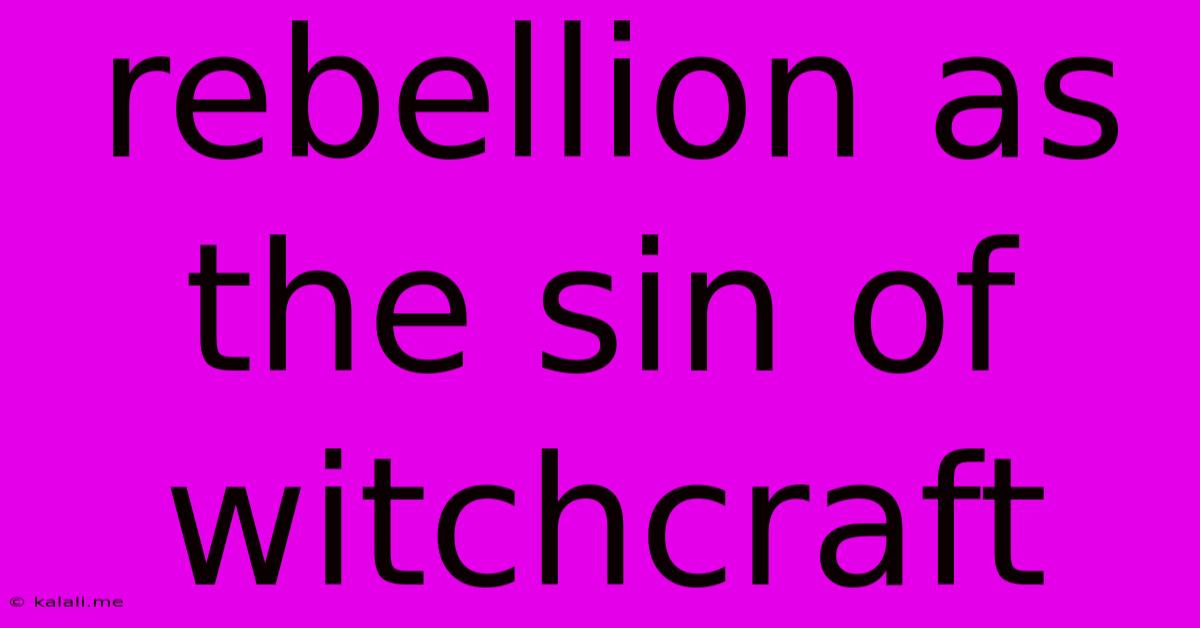Rebellion As The Sin Of Witchcraft
Kalali
Jun 06, 2025 · 3 min read

Table of Contents
Rebellion as the Sin of Witchcraft: A Historical and Theological Examination
Meta Description: Explore the historical and theological connections between rebellion and the accusations of witchcraft, examining how defiance against societal norms and religious authority fueled the witch hunts. Discover the complex interplay of gender, power, and accusations of supernatural forces.
The association of witchcraft with rebellion is a deeply ingrained historical and theological narrative. While the concept of witchcraft itself varies across cultures and time periods, the accusation frequently served as a tool to punish and suppress those deemed rebellious against established social, political, and religious hierarchies. This article delves into the historical context of these accusations, analyzing the ways in which acts of defiance, perceived or real, were conflated with the practice of witchcraft, ultimately leading to persecution and suffering.
The Malleus Maleficarum and the Definition of Witchcraft
The infamous Malleus Maleficarum (Hammer of Witches), a 15th-century treatise on witchcraft, significantly shaped the understanding and prosecution of witches for centuries. This influential text directly linked witchcraft with heresy and rebellion against God. The authors, Heinrich Kramer and Jacob Sprenger, posited that witches, predominantly women, formed a pact with the Devil, rejecting God's authority and actively working against the established order. This pact, interpreted as a form of treasonous allegiance, fueled the fires of persecution. The book emphasized the inherent rebellious nature of witchcraft, framing it not just as a supernatural crime but as an act of profound spiritual and societal disobedience.
Rebellion Against Social Norms
Beyond the theological framework, accusations of witchcraft often targeted individuals who transgressed societal norms. Women who were independent, outspoken, or economically self-sufficient were frequently accused. Their refusal to conform to expected gender roles – remaining unmarried, owning property, or possessing herbal knowledge – often rendered them vulnerable to accusations. These accusations weren't merely about defying social expectations; they were about challenging the power structures that enforced those expectations. The label of "witch" became a means to silence and control women who dared to deviate from the prescribed path.
Political and Religious Dissent
Rebellion against political and religious authorities also contributed significantly to witchcraft accusations. During periods of social unrest or religious upheaval, individuals who expressed dissenting views or participated in oppositional movements were frequently targeted. Accusations of witchcraft provided a convenient mechanism to suppress dissent and maintain control. The supernatural element added a layer of fear and intimidation, making accusations difficult to refute. The inherent ambiguity of witchcraft accusations also meant that the evidence needed for conviction was often flimsy, relying heavily on hearsay and unsubstantiated claims.
The Role of Gender in Witchcraft Accusations
The overwhelming majority of those accused of witchcraft were women. This stark disparity reflects the societal power dynamics of the time. Women's subordinate position made them particularly vulnerable to accusations, which served to reinforce patriarchal structures. Their perceived defiance of patriarchal authority, whether real or imagined, often fueled accusations of witchcraft. The vulnerability of women, coupled with the potent symbolism of the female body and its association with nature and the occult, made them prime targets.
Conclusion: Rebellion and the Legacy of Witch Hunts
The connection between rebellion and accusations of witchcraft is undeniable. The historical record reveals how acts of defiance, whether overt or subtle, against societal, religious, and gendered norms, often resulted in accusations and persecution. The legacy of the witch hunts serves as a potent reminder of the dangers of using accusations of witchcraft as a means to suppress dissent and control populations. Understanding this historical connection is crucial for interpreting the complexities of power, gender, and the manipulation of fear in the past and recognizing its echoes in contemporary society. The narrative of the rebellious witch endures, a testament to the enduring power of defiance and the lasting consequences of its suppression.
Latest Posts
Latest Posts
-
What Is The Round Thing On My Ceiling
Jun 06, 2025
-
Create 4 Input Nand Using Two Input Nand Gates
Jun 06, 2025
-
How To Fix A Door Knob Hole
Jun 06, 2025
-
How To Protect A Pvc Drain Pipe Behind Drywall
Jun 06, 2025
-
Solving A System Of Differential Equations
Jun 06, 2025
Related Post
Thank you for visiting our website which covers about Rebellion As The Sin Of Witchcraft . We hope the information provided has been useful to you. Feel free to contact us if you have any questions or need further assistance. See you next time and don't miss to bookmark.